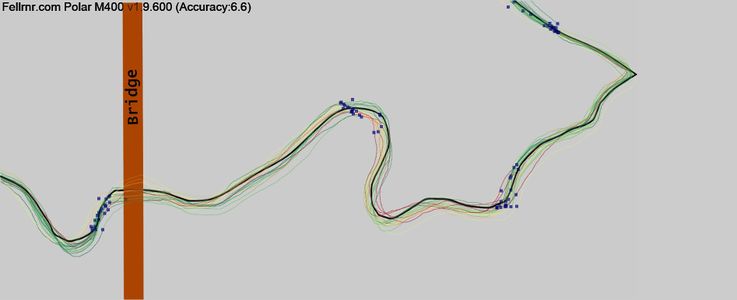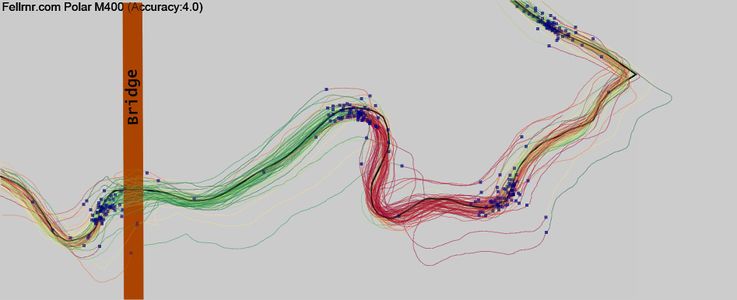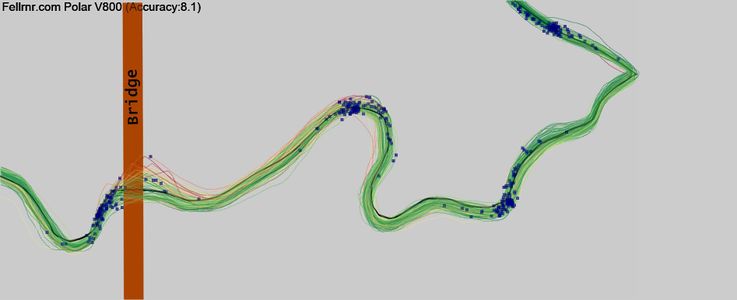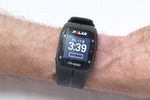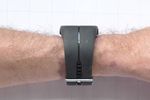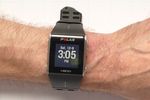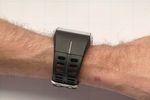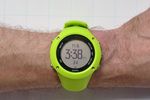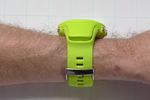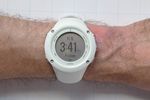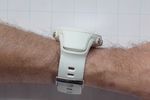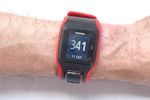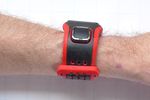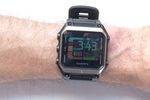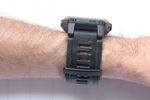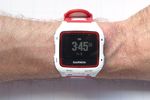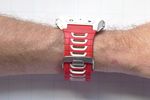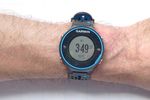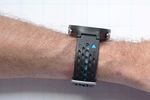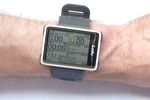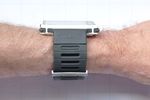Difference between revisions of "Polar M400"
User:Fellrnr (User talk:Fellrnr | contribs) |
User:Fellrnr (User talk:Fellrnr | contribs) m (comment: batch update) |
||
| (6 intermediate revisions by the same user not shown) | |||
| Line 1: | Line 1: | ||
{{DISPLAYTITLE:Polar M400 Review}} | {{DISPLAYTITLE:Polar M400 Review}} | ||
[[File:Polar M400.jpg|right|thumb|200px|The {{Polar M400}}.]] | [[File:Polar M400.jpg|right|thumb|200px|The {{Polar M400}}.]] | ||
| − | + | I was initially very disappointed with the {{Polar M400}}, but over time I've come to appreciate the M400 more and more. There are a number of factors, not least of which is that it now sells for far less than its release price, making it a lot more competitive. Its [[GPS Accuracy]] has also improved, though it still mediocre. This accuracy problem is offset by its reasonable support for the [[Stryd]] Footpod that is extremely accurate. The main competition the M400 faces is the [[Garmin Vivoactive]]. The Vivoactive is a better watch in virtually every respect, except for its Stryd support. In order to get the Vivoactive to get pace and distance information from Stryd you have to turn off GPS, while the M400 can use Stryd for pace and distance whilst still recording a GPS track. | |
| − | * '''How far did I run?''' This is the most basic question, and the M400 has | + | * '''How far did I run?''' This is the most basic question, and the M400 has poor GPS accuracy, but this can be offset by using the Stryd Footpod. It may seem odd to spend more on a Footpod than the watch, but I'd argue this is actually a reasonable compromise. |
| − | * '''How fast am I running?''' Knowing how fast you're running can be a nice to know, or it can be vital for your training or race performance. Because of the nature of GPS, watches that rely on GPS signal alone tend to have serious problems with current pace. | + | * '''How fast am I running?''' Knowing how fast you're running can be a nice to know, or it can be vital for your training or race performance. Because of the nature of GPS, watches that rely on GPS signal alone tend to have serious problems with current pace. With the Stryd Footpod, you can get extremely accurate pace information, but without it, the M400 is pretty hopeless. |
| − | * '''Where am I? '''The M400 has | + | * '''Where am I? '''The M400 has only a simple "back to start" arrow, which is better than nothing, but remember this is an "as the crow flies" direct path, not a backtrack. |
| − | * '''What's my cadence? '''[[Cadence]]''' '''is one of the most critical and often overlooked aspects of running. If you get your Cadence right, many other things naturally fall into place. The M400 has | + | * '''What's my cadence? '''[[Cadence]]''' '''is one of the most critical and often overlooked aspects of running. If you get your Cadence right, many other things naturally fall into place. The M400 has support for other [[Footpod]]s besides Stryd, plus it has support for Cadence from the internal accelerometer. There are no Cadence alerts which is a shame, but typically this feature is only available on more expensive devices. |
| − | The M400 is not a good choice for ultrarunners, as its battery life is too short. See [[ | + | The M400 is not a good choice for ultrarunners, as its battery life is too short. See [[Best Running Watch#Watches for Ultrarunning| Watches for Ultrarunning]] for more details. |
| + | {{BuyAmazon|AZID=B00NPZ7WNU|AZN=Polar M400}} | ||
| + | =Should You Buy The M400?= | ||
| + | I think that in most cases, at this price point you should buy the [[Garmin Vivoactive]] over the M400. The Vivoactive has far more functionality than the M400, including Connect IQ that allows for expanded functionality through downloaded apps. The Vivoactive is a vastly better activity tracker, especially when combined with a good Connect IQ watch face that gives you better feedback on how you're doing. You can even use the Vivoactive on an ultramarathon by [[Charge On The Run]], something that much harder with the M400. Both watches will support the [[Stryd]] Footpod for extremely accurate distance and pace information, but they have different trade-offs. The M400 can still record a GPS track whilst getting distance and pace from the Stryd, where the Vivoactive has to have GPS disabled. On the other hand, the Vivoactive can display the Stryd estimate of [[Running Power Meters| Running Power]] far better than the M400, and it can record this power estimate along with other metrics such as Ground Contact Time. Therefore, I'd only recommend someone buys the M 400 if they really want to record the GPS track whilst getting pace and distance from a Stryd Footpod, otherwise by the [[Garmin Vivoactive]]. | ||
=Polar M400 Pros= | =Polar M400 Pros= | ||
* The user interface is nicely designed and intuitive; the buttons, display, and the menu system combine aesthetics with usability. The M400 has five hard buttons, which I much prefer over a touchscreen interface, especially when wearing gloves or in the rain. | * The user interface is nicely designed and intuitive; the buttons, display, and the menu system combine aesthetics with usability. The M400 has five hard buttons, which I much prefer over a touchscreen interface, especially when wearing gloves or in the rain. | ||
| + | * The support for [[Stryd]] is pretty good. As noted above, you can get pace and distance information from the Stryd whilst still recording a GPS track. The Limited navigation features mean that the GPS data is of limited use while you're running, but it does allow you to see where you went afterwards. You can only get the Stryd estimate of power through the cadence field, and that feature might disappear in the future. | ||
* Like the [[Suunto Ambit2]] and [[Polar V800]], the M400 can be configured via the website, which is easier than fiddling with the watch itself. Most of the options can be also set on the watch, which means you're not stuck if you're away from the Internet. | * Like the [[Suunto Ambit2]] and [[Polar V800]], the M400 can be configured via the website, which is easier than fiddling with the watch itself. Most of the options can be also set on the watch, which means you're not stuck if you're away from the Internet. | ||
* The M400 provides more information when you press the lap button than most other watches. | * The M400 provides more information when you press the lap button than most other watches. | ||
| − | * The M400 can act as a simple activity monitor, but it only has only an internal accelerometer which provides poor accuracy | + | * The M400 can act as a simple activity monitor, but it only has only an internal accelerometer which provides poor accuracy. |
* The cable to charge and sync the M400 is a standard micro-USB that's waterproof. Most watches use a specialist cable that's expensive to replace if lost. | * The cable to charge and sync the M400 is a standard micro-USB that's waterproof. Most watches use a specialist cable that's expensive to replace if lost. | ||
=Polar M400 Cons= | =Polar M400 Cons= | ||
| − | * Unlike the [[Polar V800]], the M400 has poor [[GPS Accuracy]] | + | * Unlike the [[Polar V800]], the M400 has poor [[GPS Accuracy]]. |
* Polar has added support for a [[Footpod]] with version 1.4 of firmware, but this is problematic. | * Polar has added support for a [[Footpod]] with version 1.4 of firmware, but this is problematic. | ||
| − | ** The Polar Stride Sensor is fully supported by the M400, with automatic calibration and it will display stride length as well as cadence. However, the Stride Sensor is huge and heavy when compared with modern Footpods, weighing over three times as much as a Garmin Footpod. Because of its size and weight, it requires lacing into the shoelaces, making it a real pain to move between shoes. <jfs id="B00CCASIMS" noreferb="true | + | ** The Polar Stride Sensor is fully supported by the M400, with automatic calibration and it will display stride length as well as cadence. However, the Stride Sensor is huge and heavy when compared with modern Footpods, weighing over three times as much as a Garmin Footpod. Because of its size and weight, it requires lacing into the shoelaces, making it a real pain to move between shoes. <jfs id="B00CCASIMS" noreferb="true"/> |
| + | ** The [[Stryd]] Footpod and the [[MilestonePod]] work well with the M400. | ||
** Some third party Bluetooth Footpods, like the "i-gotU" will pair with the M400, but then won't display cadence and prevent the M400 from recording any distance travelled. | ** Some third party Bluetooth Footpods, like the "i-gotU" will pair with the M400, but then won't display cadence and prevent the M400 from recording any distance travelled. | ||
| − | ** The Adidas miCoach Speed Cell will work with the M400, but it's not easy. By default it will pair with the M400, but you can't set the calibration factor nor can you set the M400 to use GPS for pace/distance. You have to pair the M400 with the Polar Speed Sensor to activate the menu items you need to configure the Adidas Footpod, which is far from ideal. However, the Adidas Footpod is then a reasonable size and provides cadence (though not stride length). <jfs id="B00FEJ7FBO" noreferb="true | + | ** The Adidas miCoach Speed Cell will work with the M400, but it's not easy. By default it will pair with the M400, but you can't set the calibration factor nor can you set the M400 to use GPS for pace/distance. You have to pair the M400 with the Polar Speed Sensor to activate the menu items you need to configure the Adidas Footpod, which is far from ideal. However, the Adidas Footpod is then a reasonable size and provides cadence (though not stride length). <jfs id="B00FEJ7FBO" noreferb="true"/>. |
| − | |||
* The M400 claims to have more rapid initial satellite acquisition than earlier watches, but I have not found this to be the case. | * The M400 claims to have more rapid initial satellite acquisition than earlier watches, but I have not found this to be the case. | ||
** In my testing, I found "Time To First Fix" (TTFF) on the M400 is comparable or slightly slower than the older [[Garmin 610]]. (I tested after a 4+ hour gap since the last fix as most devices will reacquire rapidly if the gap is shorter.) | ** In my testing, I found "Time To First Fix" (TTFF) on the M400 is comparable or slightly slower than the older [[Garmin 610]]. (I tested after a 4+ hour gap since the last fix as most devices will reacquire rapidly if the gap is shorter.) | ||
| − | ** Polar states they use [http://www.u-blox.com/en/assisted-gps.html AssistNow, a technology from u-blox | + | ** Polar states they use [http://www.u-blox.com/en/assisted-gps.html AssistNow], a technology from u-blox which does satellite prediction. AssistNow can use a downloaded prediction file or simply calculate the positions offline. With version 1.4 of the firmware, the synchronization software was updated to indicate that the offline file had been downloaded, and the watch will now indicate how long the file is valid for. However, even with version 1.4, the TTFF is still slow compared with competing devices. |
| − | |||
| − | |||
* Like the Polar V800, the M400 uses visual tricks to appear smaller than it is. The watch is curved, so the first part of the watch strap is really part of the watch body. This can cause problems for runners with smaller or larger wrists. I have to wear the V800 and M400 over a wrist sweat band as my writs are quite small. (I have no problem with watches that appear to be bigger, like the [[Garmin 310XT]].) | * Like the Polar V800, the M400 uses visual tricks to appear smaller than it is. The watch is curved, so the first part of the watch strap is really part of the watch body. This can cause problems for runners with smaller or larger wrists. I have to wear the V800 and M400 over a wrist sweat band as my writs are quite small. (I have no problem with watches that appear to be bigger, like the [[Garmin 310XT]].) | ||
* There is no vibration alert, something I miss. | * There is no vibration alert, something I miss. | ||
* I've found the battery on the M400 seems to run low far earlier than the claimed 8 hours. I've had the low battery alert after only 4 hours, though I was using the backlight. I've also found that leaving the M400 in the state where it is ready to start, with the GPS signal acquired, the battery will run down quite quickly. Slower marathon runners could have problems with the battery life of the M400, and it could not be used for most ultramarathons. | * I've found the battery on the M400 seems to run low far earlier than the claimed 8 hours. I've had the low battery alert after only 4 hours, though I was using the backlight. I've also found that leaving the M400 in the state where it is ready to start, with the GPS signal acquired, the battery will run down quite quickly. Slower marathon runners could have problems with the battery life of the M400, and it could not be used for most ultramarathons. | ||
| − | |||
* The M400 will give an estimate of [[VO2max|V̇O<sub>2</sub>max]] if you're wearing a Heart Rate Monitor, but I didn't find its estimate as accurate as the [[Firstbeat]] software used by Garmin and Suunto. | * The M400 will give an estimate of [[VO2max|V̇O<sub>2</sub>max]] if you're wearing a Heart Rate Monitor, but I didn't find its estimate as accurate as the [[Firstbeat]] software used by Garmin and Suunto. | ||
* It's a minor problem, but if you have a Heart Rate Monitor strap paired with the M400 but don't have it on you, the M400 will wildly overestimate your calories and effort. | * It's a minor problem, but if you have a Heart Rate Monitor strap paired with the M400 but don't have it on you, the M400 will wildly overestimate your calories and effort. | ||
| Line 42: | Line 43: | ||
* '''Alerts'''. Some watches will alert you when a metric is out of range. The alert for [[Cadence]] is really useful and one of my favorite features. (Of course the M400 doesn't even support Cadence.) | * '''Alerts'''. Some watches will alert you when a metric is out of range. The alert for [[Cadence]] is really useful and one of my favorite features. (Of course the M400 doesn't even support Cadence.) | ||
* '''WiFi/Bluetooth Uploads'''. While the automatic upload of workouts via WiFi or Bluetooth to a Smartphone is nice, the upload will typically only go to the manufacturer's web site. | * '''WiFi/Bluetooth Uploads'''. While the automatic upload of workouts via WiFi or Bluetooth to a Smartphone is nice, the upload will typically only go to the manufacturer's web site. | ||
| − | |||
=GPS Accuracy= | =GPS Accuracy= | ||
| − | + | For quite some time, the M400 had the worst GPS accuracy of any device I've tested, but recent firmware upgrades have improved matters somewhat. The GPS accuracy is still rather mediocre at best, but at least it's not as appalling as it once was. It looks like Polar are using an unusual GPS chipset in the M400. I've not seen any other device using the u-blox chipset, and the replacement for the M400 (M430) returns to using the same chipset manufacturer as the [[Polar V800]] which has outstanding GPS accuracy. The firmware upgrade is also fixed the problem where the M400 would report losing satellite signal with the message "There's no GPS signal". This was occurring under conditions where another device is doing fine and there are not circumstances that should cause a problem | |
| − | |||
| − | |||
| − | |||
| − | |||
| − | |||
| − | |||
| − | |||
| − | |||
{| class="wikitable" | {| class="wikitable" | ||
|- valign="top" | |- valign="top" | ||
| − | + | [[File:BridgePolar M400 v1.9.600.jpg|none|thumb|x300px|Here's the tracks from the M400 with the 1.9 firmware. This diagram has tracks color coded with green indicating good accuracy through to red indicating poor accuracy, and the lap markers as blue dots.]] | |
| + | |[[File:BridgePolar M400.jpg|none|thumb|x300px|For comparison, this is the M400 with the earlier 1.4 firmware. You can see a few tracks where the M400 has shifted out of position even though the shape of the course is maintained. The blue lap markers are quite spread out, suggesting some positional accuracy problems. You can see from the green lines going under the bridge that the M400 does quite well in that situation, and there are no sudden changes in position on emerging. I suspect this is because the M400 is doing a lot of smoothing, which works well in that situation. The middle segment that is quite curved is nearly all red, and this is one of the areas where the M400 is a smoothing too much and cutting the corners. You can see the M400 does worse here than in the sharp turn to the right of the image. ]] | ||
| + | |- valign="top" | ||
|[[File:BridgePolar V800.jpg|none|thumb|x300px|The Polar V800 is one of the most accurate devices I've tested, and you can see that the majority of the tracks are green indicating good accuracy. Notice the problems the V800 is having at the bridge. Rather strangely the lap markers are far more spread out than I would have expected on a device this accurate. ]] | |[[File:BridgePolar V800.jpg|none|thumb|x300px|The Polar V800 is one of the most accurate devices I've tested, and you can see that the majority of the tracks are green indicating good accuracy. Notice the problems the V800 is having at the bridge. Rather strangely the lap markers are far more spread out than I would have expected on a device this accurate. ]] | ||
| − | |||
| − | |||
| − | |||
| − | |||
| − | |||
| − | |||
|} | |} | ||
=Visual Comparison= | =Visual Comparison= | ||
Latest revision as of 08:31, 1 June 2017
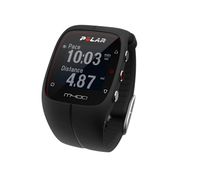
I was initially very disappointed with the Polar M400, but over time I've come to appreciate the M400 more and more. There are a number of factors, not least of which is that it now sells for far less than its release price, making it a lot more competitive. Its GPS Accuracy has also improved, though it still mediocre. This accuracy problem is offset by its reasonable support for the Stryd Footpod that is extremely accurate. The main competition the M400 faces is the Garmin Vivoactive. The Vivoactive is a better watch in virtually every respect, except for its Stryd support. In order to get the Vivoactive to get pace and distance information from Stryd you have to turn off GPS, while the M400 can use Stryd for pace and distance whilst still recording a GPS track.
- How far did I run? This is the most basic question, and the M400 has poor GPS accuracy, but this can be offset by using the Stryd Footpod. It may seem odd to spend more on a Footpod than the watch, but I'd argue this is actually a reasonable compromise.
- How fast am I running? Knowing how fast you're running can be a nice to know, or it can be vital for your training or race performance. Because of the nature of GPS, watches that rely on GPS signal alone tend to have serious problems with current pace. With the Stryd Footpod, you can get extremely accurate pace information, but without it, the M400 is pretty hopeless.
- Where am I? The M400 has only a simple "back to start" arrow, which is better than nothing, but remember this is an "as the crow flies" direct path, not a backtrack.
- What's my cadence? Cadence is one of the most critical and often overlooked aspects of running. If you get your Cadence right, many other things naturally fall into place. The M400 has support for other Footpods besides Stryd, plus it has support for Cadence from the internal accelerometer. There are no Cadence alerts which is a shame, but typically this feature is only available on more expensive devices.
The M400 is not a good choice for ultrarunners, as its battery life is too short. See Watches for Ultrarunning for more details.

| This review was made possible by readers like you buying products via my links. I buy all the products I review through normal retail channels, which allows me to create unbiased reviews free from the influence of reciprocity, or the need to keep vendors happy. It also ensures I don't get "reviewer specials" that are better than the retail versions.
|
Contents
1 Should You Buy The M400?
I think that in most cases, at this price point you should buy the Garmin Vivoactive over the M400. The Vivoactive has far more functionality than the M400, including Connect IQ that allows for expanded functionality through downloaded apps. The Vivoactive is a vastly better activity tracker, especially when combined with a good Connect IQ watch face that gives you better feedback on how you're doing. You can even use the Vivoactive on an ultramarathon by Charge On The Run, something that much harder with the M400. Both watches will support the Stryd Footpod for extremely accurate distance and pace information, but they have different trade-offs. The M400 can still record a GPS track whilst getting distance and pace from the Stryd, where the Vivoactive has to have GPS disabled. On the other hand, the Vivoactive can display the Stryd estimate of Running Power far better than the M400, and it can record this power estimate along with other metrics such as Ground Contact Time. Therefore, I'd only recommend someone buys the M 400 if they really want to record the GPS track whilst getting pace and distance from a Stryd Footpod, otherwise by the Garmin Vivoactive.
2 Polar M400 Pros
- The user interface is nicely designed and intuitive; the buttons, display, and the menu system combine aesthetics with usability. The M400 has five hard buttons, which I much prefer over a touchscreen interface, especially when wearing gloves or in the rain.
- The support for Stryd is pretty good. As noted above, you can get pace and distance information from the Stryd whilst still recording a GPS track. The Limited navigation features mean that the GPS data is of limited use while you're running, but it does allow you to see where you went afterwards. You can only get the Stryd estimate of power through the cadence field, and that feature might disappear in the future.
- Like the Suunto Ambit2 and Polar V800, the M400 can be configured via the website, which is easier than fiddling with the watch itself. Most of the options can be also set on the watch, which means you're not stuck if you're away from the Internet.
- The M400 provides more information when you press the lap button than most other watches.
- The M400 can act as a simple activity monitor, but it only has only an internal accelerometer which provides poor accuracy.
- The cable to charge and sync the M400 is a standard micro-USB that's waterproof. Most watches use a specialist cable that's expensive to replace if lost.
3 Polar M400 Cons
- Unlike the Polar V800, the M400 has poor GPS Accuracy.
- Polar has added support for a Footpod with version 1.4 of firmware, but this is problematic.
- The Polar Stride Sensor is fully supported by the M400, with automatic calibration and it will display stride length as well as cadence. However, the Stride Sensor is huge and heavy when compared with modern Footpods, weighing over three times as much as a Garmin Footpod. Because of its size and weight, it requires lacing into the shoelaces, making it a real pain to move between shoes. Error: Could not parse data from Amazon!
- The Stryd Footpod and the MilestonePod work well with the M400.
- Some third party Bluetooth Footpods, like the "i-gotU" will pair with the M400, but then won't display cadence and prevent the M400 from recording any distance travelled.
- The Adidas miCoach Speed Cell will work with the M400, but it's not easy. By default it will pair with the M400, but you can't set the calibration factor nor can you set the M400 to use GPS for pace/distance. You have to pair the M400 with the Polar Speed Sensor to activate the menu items you need to configure the Adidas Footpod, which is far from ideal. However, the Adidas Footpod is then a reasonable size and provides cadence (though not stride length). Error: Could not parse data from Amazon!.
- The M400 claims to have more rapid initial satellite acquisition than earlier watches, but I have not found this to be the case.
- In my testing, I found "Time To First Fix" (TTFF) on the M400 is comparable or slightly slower than the older Garmin 610. (I tested after a 4+ hour gap since the last fix as most devices will reacquire rapidly if the gap is shorter.)
- Polar states they use AssistNow, a technology from u-blox which does satellite prediction. AssistNow can use a downloaded prediction file or simply calculate the positions offline. With version 1.4 of the firmware, the synchronization software was updated to indicate that the offline file had been downloaded, and the watch will now indicate how long the file is valid for. However, even with version 1.4, the TTFF is still slow compared with competing devices.
- Like the Polar V800, the M400 uses visual tricks to appear smaller than it is. The watch is curved, so the first part of the watch strap is really part of the watch body. This can cause problems for runners with smaller or larger wrists. I have to wear the V800 and M400 over a wrist sweat band as my writs are quite small. (I have no problem with watches that appear to be bigger, like the Garmin 310XT.)
- There is no vibration alert, something I miss.
- I've found the battery on the M400 seems to run low far earlier than the claimed 8 hours. I've had the low battery alert after only 4 hours, though I was using the backlight. I've also found that leaving the M400 in the state where it is ready to start, with the GPS signal acquired, the battery will run down quite quickly. Slower marathon runners could have problems with the battery life of the M400, and it could not be used for most ultramarathons.
- The M400 will give an estimate of V̇O2max if you're wearing a Heart Rate Monitor, but I didn't find its estimate as accurate as the Firstbeat software used by Garmin and Suunto.
- It's a minor problem, but if you have a Heart Rate Monitor strap paired with the M400 but don't have it on you, the M400 will wildly overestimate your calories and effort.
4 What's Missing
While I don't consider these missing features as 'cons', it's worth understanding the features that are missing compared with other watches.
- Altimeter. GPS is far less accurate vertically than horizontally, so a barometric altimeter can provide a much better idea of your ascent and descent. It can also be useful for navigation if you're ascending or descending a mountain. In some races I've been far more interested in how much ascent is left rather than the distance to the top.
- Navigation. The navigation capabilities are useful if there is a risk of getting lost. I've made good use of this feature when running in an unfamiliar city, or when running remote trails. There is a rudimentary "back to start" functionality that gives you an arrow pointing back, but that's a poor substitute.
- Downloadable Apps. Smart watches have got is used to the idea of a device that can be extended with new functionality, and this concept is being introduced to running watches.
- Extended battery life. Some porches can extend the battery life by turning the GPS reception off for short periods. This can dramatically reduce GPS accuracy, but it's a useful trade-off for some ultramarathons.
- Training Effect. The Firstbeat Training Effect gives you a sense of how hard each workout is, and this sometimes includes the time for recovery.
- Graphs. Instead of simply displaying a numeric value for things like heart rate, some watches will display a graph of the value over time, giving you a sense of how things are progressing.
- Running Dynamics. Some of the newer Garmin watches can show and record Vertical Oscillation (VO) and Ground Contact Time (GCT).
- Alerts. Some watches will alert you when a metric is out of range. The alert for Cadence is really useful and one of my favorite features. (Of course the M400 doesn't even support Cadence.)
- WiFi/Bluetooth Uploads. While the automatic upload of workouts via WiFi or Bluetooth to a Smartphone is nice, the upload will typically only go to the manufacturer's web site.
5 GPS Accuracy
For quite some time, the M400 had the worst GPS accuracy of any device I've tested, but recent firmware upgrades have improved matters somewhat. The GPS accuracy is still rather mediocre at best, but at least it's not as appalling as it once was. It looks like Polar are using an unusual GPS chipset in the M400. I've not seen any other device using the u-blox chipset, and the replacement for the M400 (M430) returns to using the same chipset manufacturer as the Polar V800 which has outstanding GPS accuracy. The firmware upgrade is also fixed the problem where the M400 would report losing satellite signal with the message "There's no GPS signal". This was occurring under conditions where another device is doing fine and there are not circumstances that should cause a problem
6 Visual Comparison
7 Comparison Table
I evaluate running watches in three distinct ways. Firstly, you can use a watch on its own, without any kind of Footpod. This is probably the most common way runners use their watch, but you miss out on a lot. The second rating is with a standard Footpod that is available quite cheaply. These Footpod's can be reasonably accurate once the calibrated, but calibration is a little tedious. The final evaluation is with the Stryd Footpod, which is vastly more accurate than any other type of Footpod, or and more accurate than GPS. The table below looks at the score, and the value for money of each watch for each of the three conditions. (I’ve also tested the Apple Watch 3, but I’ve not included it in these tables as it’s not really a running watch.)
| Review | With Stryd Score | With Stryd Value for money | With Footpod Score | With Footpod Value for money | Without Footpod Score | Without Footpod Value for money | Price at Amazon.com |
|---|---|---|---|---|---|---|---|
| Garmin Epix Review | 47 | 4.5 | 31 | 3.9 | 23 | 3.4 | Error: Could not parse data from Amazon! |
| Garmin Fenix 5X Review | 47 | 2.9 | 32 | 2.3 | 24 | 1.9 | Error: Could not parse data from Amazon! |
| Garmin Fenix 3 Review | 45 | 3.8 | 28 | 3.1 | 24 | 3 | Error: Could not parse data from Amazon! |
| Garmin 935 Review | 45 | 3.6 | 30 | 3 | 22 | 2.4 | Error: Could not parse data from Amazon! |
| Garmin Vivoactive HR Review | 40 | 4.9 | 21 | 3.8 | 17 | 3.8 | Error: Could not parse data from Amazon! |
| Garmin 920XT Review | 39 | 4.4 | 30 | 4.7 | 24 | 4.5 | Error: Could not parse data from Amazon! |
| Suunto Spartan Ultra Review | 37 | 2.6 | 27 | 2.3 | 23 | 2.1 | Error: Could not parse data from Amazon! |
| Garmin Vivoactive 3 Review | 36 | 4 | 19 | 2.9 | 15 | 2.8 | Error: Could not parse data from Amazon! |
| Garmin Vivoactive Review | 34 | 5.1 | 14 | 3.4 | 10 | 3.3 | Error: Could not parse data from Amazon! |
| Suunto Spartan Trainer Review | 34 | 3.9 | 23 | 3.7 | 18 | 3.4 | Error: Could not parse data from Amazon! |
| Polar V800 Review | 33 | 2.8 | 26 | 2.8 | 22 | 2.7 | Error: Could not parse data from Amazon! |
| Suunto Ambit2 Review | 32 | 3.9 | 25 | 4.3 | 21 | 4.5 | Error: Could not parse data from Amazon! |
| Suunto Ambit3 Peak Review | 32 | 3.4 | 29 | 4.1 | 25 | 4.2 | Error: Could not parse data from Amazon! |
| Garmin Fenix 2 Review | 31 | 2.9 | 22 | 2.7 | 18 | 2.5 | Error: Could not parse data from Amazon! |
| Suunto Ambit3 Run Review | 30 | 4 | 27 | 5.5 | 23 | 5.9 | Error: Could not parse data from Amazon! |
| Suunto Ambit2 R Review | 30 | 3.5 | 23 | 3.8 | 19 | 3.8 | Error: Could not parse data from Amazon! |
| Garmin 235 Review | 28 | 2.9 | 20 | 2.8 | 12 | 2 | Error: Could not parse data from Amazon! |
| Garmin 620 Review | 27 | 3.8 | 24 | 5.1 | 20 | 5.6 | Error: Could not parse data from Amazon! |
| Garmin 910XT Review | 26 | 3.9 | 26 | 6.1 | 21 | 6.7 | Error: Could not parse data from Amazon! |
| Garmin 310XT Review | 25 | 4.6 | 24 | 8.3 | 18 | 10 | Error: Could not parse data from Amazon! |
| Polar M400 Review | 25 | 4.3 | 15 | 4.5 | 11 | 4.9 | Error: Could not parse data from Amazon! |
| Garmin 225 Review | 25 | 3.8 | 13 | 3.1 | 9 | 2.9 | Error: Could not parse data from Amazon! |
| TomTom Cardio Runner Review | 25 | 3.3 | 10 | 2 | 10 | 2.5 | Error: Could not parse data from Amazon! |
| Polar M430 Review | 25 | 3.2 | 15 | 2.9 | 11 | 2.7 | Error: Could not parse data from Amazon! |
| Garmin 610 Review | 24 | 3.3 | 20 | 4.3 | 14 | 3.9 | Error: Could not parse data from Amazon! |
| Leikr Review | 10 | 1 | 20 | 2.5 | 14 | 2 | Leikr ($380) |
| Epson SF-510 Review | 4 | 0.7 | 6 | 2 | 6 | 3 | Error: Could not parse data from Amazon! |
| Epson SF-810 Review | 4 | 0.6 | 6 | 1.6 | 6 | 2.3 | Error: Could not parse data from Amazon! |
| Garmin 10 Review | 2 | 0.3 | 2 | 0.6 | 2 | 0.9 | Error: Could not parse data from Amazon! |
The score is the sum of how well each watch can answer the four basic questions (how far, how fast, where are you, what's your cadence), plus some bonus points.
- The "How far you've run" will be based on GPS only for "without Footpod" and "with Standard Footpod", but based on Stryd if supported in the "with Stryd Footpod" table..
- How fast you're running assumes you're using a Footpod if it's supported, otherwise the rating is 0-2 based on GPS accuracy.
- The "Where are you?" is based on various navigation features such as back to start, breadcrumbs, and preloaded maps. For some watches, you have to turn GPS off to get the benefit of Stryd, so those watches have worse "where are you scores" with Stryd than without.
- The cadence score uses 1 point for an internal cadence sensor, 2 points for footpod support, 1 point for support from chest strap cadence, and 1 point for cadence alerts.
- I give 1-2 bonus points for application support, 1-2 bonus points for data upload, 1-2 bonus points for Optical Heart Rate Monitoring, and 0-1 bonus points for battery life.
- Value for money is the score divided by the price (at the time I last updated the table.) Your needs may be different, so you might weight the different aspects of the watches differently, or be basing your decision on different criteria totally. Hopefully this table will give you a good starting point for your decision.
7.1 Score Breakdown without a Footpod
| Review | Score | Value for money6 | How far did you run?1 |
How fast are you running?2 |
Where are you?3 |
What's your cadence?4 |
Bonus Points5 | class="unsortable" |
Price at Amazon.com |
|---|---|---|---|---|---|---|---|---|
| Suunto Ambit3 Peak Review | 25 | 4.2 | 8 | 3 | 6 | 2 | 6 | Error: Could not parse data from Amazon! |
| Garmin 920XT Review | 24 | 4.5 | 1 | 2 | 7 | 6 | 8 | Error: Could not parse data from Amazon! |
| Garmin Fenix 3 Review | 24 | 3 | 2 | 1 | 7 | 6 | 8 | Error: Could not parse data from Amazon! |
| Garmin Fenix 5X Review | 24 | 1.9 | 1 | 0 | 9 | 6 | 8 | Error: Could not parse data from Amazon! |
| Suunto Ambit3 Run Review | 23 | 5.9 | 8 | 3 | 5 | 2 | 5 | Error: Could not parse data from Amazon! |
| Garmin Epix Review | 23 | 3.4 | 0 | 0 | 9 | 6 | 8 | Error: Could not parse data from Amazon! |
| Suunto Spartan Ultra Review | 23 | 2.1 | 8 | 2 | 6 | 2 | 5 | Error: Could not parse data from Amazon! |
| Polar V800 Review | 22 | 2.7 | 9 | 4 | 3 | 2 | 4 | Error: Could not parse data from Amazon! |
| Garmin 935 Review | 22 | 2.4 | 1 | 0 | 7 | 6 | 8 | Error: Could not parse data from Amazon! |
| Garmin 910XT Review | 21 | 6.7 | 5 | 3 | 6 | 2 | 5 | Error: Could not parse data from Amazon! |
| Suunto Ambit2 Review | 21 | 4.5 | 4 | 3 | 6 | 2 | 6 | Error: Could not parse data from Amazon! |
| Garmin 620 Review | 20 | 5.6 | 3 | 2 | 2 | 6 | 7 | Error: Could not parse data from Amazon! |
| Suunto Ambit2 R Review | 19 | 3.8 | 4 | 3 | 5 | 2 | 5 | Error: Could not parse data from Amazon! |
| Garmin 310XT Review | 18 | 10 | 7 | 2 | 4 | 0 | 5 | Error: Could not parse data from Amazon! |
| Suunto Spartan Trainer Review | 18 | 3.4 | 5 | 3 | 4 | 2 | 4 | Error: Could not parse data from Amazon! |
| Garmin Fenix 2 Review | 18 | 2.5 | 1 | 0 | 6 | 6 | 5 | Error: Could not parse data from Amazon! |
| Garmin Vivoactive HR Review | 17 | 3.8 | 0 | 0 | 2 | 6 | 9 | Error: Could not parse data from Amazon! |
| Garmin Vivoactive 3 Review | 15 | 2.8 | 0 | 0 | 4 | 4 | 7 | Error: Could not parse data from Amazon! |
| Garmin 610 Review | 14 | 3.9 | 3 | 2 | 3 | 2 | 4 | Error: Could not parse data from Amazon! |
| Leikr Review | 14 | 2 | 5 | 2 | 4 | 0 | 3 | Leikr ($380) |
| Garmin 235 Review | 12 | 2 | 0 | 0 | 2 | 2 | 8 | Error: Could not parse data from Amazon! |
| Polar M400 Review | 11 | 4.9 | 3 | 1 | 1 | 2 | 4 | Error: Could not parse data from Amazon! |
| Polar M430 Review | 11 | 2.7 | 3 | 1 | 1 | 2 | 4 | Error: Could not parse data from Amazon! |
| Garmin Vivoactive Review | 10 | 3.3 | 0 | 0 | 0 | 6 | 4 | Error: Could not parse data from Amazon! |
| TomTom Cardio Runner Review | 10 | 2.5 | 2 | 1 | 0 | 2 | 5 | Error: Could not parse data from Amazon! |
| Garmin 225 Review | 9 | 2.9 | 1 | 1 | 0 | 2 | 5 | Error: Could not parse data from Amazon! |
| Epson SF-510 Review | 6 | 3 | 0 | 0 | 0 | 2 | 4 | Error: Could not parse data from Amazon! |
| Epson SF-810 Review | 6 | 2.3 | 1 | 0 | 0 | 2 | 3 | Error: Could not parse data from Amazon! |
| Garmin 10 Review | 2 | 0.9 | 0 | 0 | 0 | 0 | 2 | Error: Could not parse data from Amazon! |
7.2 Score Breakdown with a Standard Footpod
| Review | Score | Value for money6 | How far did you run?1 |
How fast are you running?2 |
Where are you?3 |
What's your cadence?4 |
Bonus Points5 | class="unsortable" |
Price at Amazon.com |
|---|---|---|---|---|---|---|---|---|
| Garmin Fenix 5X Review | 32 | 2.3 | 1 | 4 | 9 | 10 | 8 | Error: Could not parse data from Amazon! |
| Garmin Epix Review | 31 | 3.9 | 0 | 4 | 9 | 10 | 8 | Error: Could not parse data from Amazon! |
| Garmin 920XT Review | 30 | 4.7 | 1 | 4 | 7 | 10 | 8 | Error: Could not parse data from Amazon! |
| Garmin 935 Review | 30 | 3 | 1 | 4 | 7 | 10 | 8 | Error: Could not parse data from Amazon! |
| Suunto Ambit3 Peak Review | 29 | 4.1 | 8 | 3 | 6 | 6 | 6 | Error: Could not parse data from Amazon! |
| Garmin Fenix 3 Review | 28 | 3.1 | 2 | 1 | 7 | 10 | 8 | Error: Could not parse data from Amazon! |
| Suunto Ambit3 Run Review | 27 | 5.5 | 8 | 3 | 5 | 6 | 5 | Error: Could not parse data from Amazon! |
| Suunto Spartan Ultra Review | 27 | 2.3 | 8 | 2 | 6 | 6 | 5 | Error: Could not parse data from Amazon! |
| Garmin 910XT Review | 26 | 6.1 | 5 | 4 | 6 | 6 | 5 | Error: Could not parse data from Amazon! |
| Polar V800 Review | 26 | 2.8 | 9 | 4 | 3 | 6 | 4 | Error: Could not parse data from Amazon! |
| Suunto Ambit2 Review | 25 | 4.3 | 4 | 3 | 6 | 6 | 6 | Error: Could not parse data from Amazon! |
| Garmin 310XT Review | 24 | 8.3 | 7 | 4 | 4 | 4 | 5 | Error: Could not parse data from Amazon! |
| Garmin 620 Review | 24 | 5.1 | 3 | 2 | 2 | 10 | 7 | Error: Could not parse data from Amazon! |
| Suunto Ambit2 R Review | 23 | 3.8 | 4 | 3 | 5 | 6 | 5 | Error: Could not parse data from Amazon! |
| Suunto Spartan Trainer Review | 23 | 3.7 | 5 | 4 | 4 | 6 | 4 | Error: Could not parse data from Amazon! |
| Garmin Fenix 2 Review | 22 | 2.7 | 1 | 0 | 6 | 10 | 5 | Error: Could not parse data from Amazon! |
| Garmin Vivoactive HR Review | 21 | 3.8 | 0 | 0 | 2 | 10 | 9 | Error: Could not parse data from Amazon! |
| Garmin 610 Review | 20 | 4.3 | 3 | 4 | 3 | 6 | 4 | Error: Could not parse data from Amazon! |
| Garmin 235 Review | 20 | 2.8 | 0 | 4 | 2 | 6 | 8 | Error: Could not parse data from Amazon! |
| Leikr Review | 20 | 2.5 | 5 | 4 | 4 | 4 | 3 | Leikr ($380) |
| Garmin Vivoactive 3 Review | 19 | 2.9 | 0 | 0 | 4 | 8 | 7 | Error: Could not parse data from Amazon! |
| Polar M400 Review | 15 | 4.5 | 3 | 1 | 1 | 6 | 4 | Error: Could not parse data from Amazon! |
| Polar M430 Review | 15 | 2.9 | 3 | 1 | 1 | 6 | 4 | Error: Could not parse data from Amazon! |
| Garmin Vivoactive Review | 14 | 3.4 | 0 | 0 | 0 | 10 | 4 | Error: Could not parse data from Amazon! |
| Garmin 225 Review | 13 | 3.1 | 1 | 1 | 0 | 6 | 5 | Error: Could not parse data from Amazon! |
| TomTom Cardio Runner Review | 10 | 2 | 2 | 1 | 0 | 2 | 5 | Error: Could not parse data from Amazon! |
| Epson SF-510 Review | 6 | 2 | 0 | 0 | 0 | 2 | 4 | Error: Could not parse data from Amazon! |
| Epson SF-810 Review | 6 | 1.6 | 1 | 0 | 0 | 2 | 3 | Error: Could not parse data from Amazon! |
| Garmin 10 Review | 2 | 0.6 | 0 | 0 | 0 | 0 | 2 | Error: Could not parse data from Amazon! |
7.3 Score Breakdown with a Stryd Footpod
| Review | Score | Value for money6 | How far did you run?1 |
How fast are you running?2 |
Where are you?3 |
What's your cadence?4 |
Bonus Points5 | class="unsortable" |
Price at Amazon.com |
|---|---|---|---|---|---|---|---|---|
| Garmin Epix Review | 47 | 4.5 | 10 | 10 | 9 | 10 | 8 | Error: Could not parse data from Amazon! |
| Garmin Fenix 5X Review | 47 | 2.9 | 10 | 10 | 9 | 10 | 8 | Error: Could not parse data from Amazon! |
| Garmin Fenix 3 Review | 45 | 3.8 | 10 | 10 | 7 | 10 | 8 | Error: Could not parse data from Amazon! |
| Garmin 935 Review | 45 | 3.6 | 10 | 10 | 7 | 10 | 8 | Error: Could not parse data from Amazon! |
| Garmin Vivoactive HR Review | 40 | 4.9 | 10 | 10 | 1 | 10 | 9 | Error: Could not parse data from Amazon! |
| Garmin 920XT Review | 39 | 4.4 | 10 | 10 | 1 | 10 | 8 | Error: Could not parse data from Amazon! |
| Suunto Spartan Ultra Review | 37 | 2.6 | 10 | 10 | 6 | 6 | 5 | Error: Could not parse data from Amazon! |
| Garmin Vivoactive 3 Review | 36 | 4 | 10 | 10 | 1 | 8 | 7 | Error: Could not parse data from Amazon! |
| Garmin Vivoactive Review | 34 | 5.1 | 10 | 10 | 0 | 10 | 4 | Error: Could not parse data from Amazon! |
| Suunto Spartan Trainer Review | 34 | 3.9 | 10 | 10 | 4 | 6 | 4 | Error: Could not parse data from Amazon! |
| Polar V800 Review | 33 | 2.8 | 10 | 10 | 3 | 6 | 4 | Error: Could not parse data from Amazon! |
| Suunto Ambit2 Review | 32 | 3.9 | 10 | 10 | 6 | 0 | 6 | Error: Could not parse data from Amazon! |
| Suunto Ambit3 Peak Review | 32 | 3.4 | 10 | 10 | 6 | 0 | 6 | Error: Could not parse data from Amazon! |
| Garmin Fenix 2 Review | 31 | 2.9 | 10 | 10 | 6 | 0 | 5 | Error: Could not parse data from Amazon! |
| Suunto Ambit3 Run Review | 30 | 4 | 10 | 10 | 5 | 0 | 5 | Error: Could not parse data from Amazon! |
| Suunto Ambit2 R Review | 30 | 3.5 | 10 | 10 | 5 | 0 | 5 | Error: Could not parse data from Amazon! |
| Garmin 235 Review | 28 | 2.9 | 10 | 10 | 0 | 0 | 8 | Error: Could not parse data from Amazon! |
| Garmin 620 Review | 27 | 3.8 | 10 | 10 | 0 | 0 | 7 | Error: Could not parse data from Amazon! |
| Garmin 910XT Review | 26 | 3.9 | 10 | 10 | 1 | 0 | 5 | Error: Could not parse data from Amazon! |
| Garmin 310XT Review | 25 | 4.6 | 10 | 10 | 0 | 0 | 5 | Error: Could not parse data from Amazon! |
| Polar M400 Review | 25 | 4.3 | 10 | 10 | 1 | 0 | 4 | Error: Could not parse data from Amazon! |
| Garmin 225 Review | 25 | 3.8 | 10 | 10 | 0 | 0 | 5 | Error: Could not parse data from Amazon! |
| TomTom Cardio Runner Review | 25 | 3.3 | 10 | 10 | 0 | 0 | 5 | Error: Could not parse data from Amazon! |
| Polar M430 Review | 25 | 3.2 | 10 | 10 | 1 | 0 | 4 | Error: Could not parse data from Amazon! |
| Garmin 610 Review | 24 | 3.3 | 10 | 10 | 0 | 0 | 4 | Error: Could not parse data from Amazon! |
| Leikr Review | 10 | 1 | 5 | 2 | 0 | 0 | 3 | Leikr ($380) |
| Epson SF-510 Review | 4 | 0.7 | 0 | 0 | 0 | 0 | 4 | Error: Could not parse data from Amazon! |
| Epson SF-810 Review | 4 | 0.6 | 1 | 0 | 0 | 0 | 3 | Error: Could not parse data from Amazon! |
| Garmin 10 Review | 2 | 0.3 | 0 | 0 | 0 | 0 | 2 | Error: Could not parse data from Amazon! |
7.4 Basic Features
|
Review |
Released | GPS Accuracy |
Weight (oz) | Size (CM3) | Display (mm) | Resolution (Pixels) | Waterproofing | Heart Rate Monitor |
Cadence | Data Upload |
|---|---|---|---|---|---|---|---|---|---|---|
| Garmin Epix Review | 2015 | 6.2 | 3.0 | 48 | 29 x 21 (609mm2) | 205 x 148 (30.3K total) | Good (50m) | Yes | Internal/Footpod/Heart Rate Monitor/Alert | Yes |
| Garmin Fenix 5X Review | 2017 | 5.6 | 3.5 | 36 | 30.5 (round) (731mm2) | 240 diameter (45.2K total) | Good (100m) | Yes | Internal/Footpod/Heart Rate Monitor/Alert | Yes |
| Garmin Fenix 3 Review | 2015 | 6.2 | 2.9 | 33 | 30 (round) (726mm2) | 218 diameter (37.3K total) | Good (100m) | Yes | Internal/Footpod/Heart Rate Monitor/Alert | Yes |
| Garmin 935 Review | 2017 | 5.6 | 1.7 | 24 | 30.5 (round) (731mm2) | 240 diameter (45.2K total) | Good (100m) | Yes | Internal/Footpod/Heart Rate Monitor/Alert | Yes |
| Garmin Vivoactive HR Review | 2016 | 4.9 | 1.7 | 19 | 21 x 29 (609mm2) | 148 x 205 (30.3K total) | Good (50m) | Yes (+OHRM) | Internal/Footpod/Heart Rate Monitor/Alert | Yes |
| Garmin 920XT Review | 2014 | 6.6 | 2.2 | 35 | 29 x 21 (609mm2) | 205 x 148 (30.3K total) | Good (50m) | Yes | Internal/Footpod/Heart Rate Monitor/Alert | Yes |
| Garmin Vivoactive 3 Review | 2017 | 1.5 | 17 | 30.5 (round) (731mm2) | 240 diameter (45.2K total) | Good (50m) | Yes (+OHRM) | Internal/Footpod | Yes | |
| Garmin Vivoactive Review | 2015 | 5.4 | 1.3 | 13 | 29 x 21 (592mm2) | 205 x 148 (30.3K total) | Good (50m) | Yes | Internal/Footpod/Heart Rate Monitor/Alert | Yes |
| Suunto Spartan Trainer Review | 2017 | 7.8 | 2.0 | 25 | 24 x 23 (529mm2) | 128 diameter (12.9K total) | Good (50m) | Yes (+OHRM) | Internal/Footpod | Yes |
| Suunto Ambit2 Review | 2013 | 7.6 | 3.1 | 30 | 29 (round) (661mm2) | 128 diameter (12.9K total) | Good (100m) | Yes | Internal/Footpod | Yes |
| Suunto Ambit3 Peak Review | 2014 | 7.9 | 2.9 | 30 | 29 (round) (661mm2) | 128 diameter (12.9K total) | Good (100m) | Yes | Internal/Footpod | Yes |
| Suunto Spartan Ultra Review | 2016 | 7.1 | 2.7 | 38 | 32 (round) (804mm2) | 320 diameter (80.4K total) | Good (100m) | Yes | Internal (Limited Footpod) | Yes |
| Garmin Fenix 2 Review | 2014 | 5.7 | 3.2 | 32 | 31 (round) (755mm2) | 70 diameter (3.8K total) | Good (50m) | Yes | Internal/Footpod/Heart Rate Monitor/Alert | Yes |
| Suunto Ambit3 Run Review | 2014 | 7.9 | 2.5 | 30 | 29 (round) (661mm2) | 128 x 128 (16.4K total) | Good (50m) | Yes | Internal/Footpod | Yes |
| Suunto Ambit2 R Review | 2013 | 7.6 | 2.5 | 30 | 29 (round) (661mm2) | 128 diameter (12.9K total) | Good (50m) | Yes | Internal/Footpod | Yes |
| Garmin 235 Review | 2015 | 4.9 | 1.5 | 19 | 31 (round) (755mm2) | 215 diameter (36.3K total) | Good (50m) | Yes (+OHRM) | Internal/Footpod | Yes |
| Garmin 620 Review | 2013 | 7.1 | 1.5 | 20 | 25.4 (round) (507mm2) | 180 diameter (25.4K total) | Good (50m) | Yes | Internal/Footpod/Heart Rate Monitor/Alert | Yes |
| Garmin 910XT Review | 2011 | 7.5 | 2.5 | 49 | 33 x 20 (660mm2) | 160 x 100 (16K total) | Good (50m) | Yes | Footpod/Alert | Yes |
| Garmin 310XT Review | 2009 | 7.5 | 2.5 | 63 | 33 x 20 (660mm2) | 160 x 100 (16K total) | Good (50m) | Yes | Footpod | Yes |
| Garmin 225 Review | 2015 | 6.2 | 1.5 | 24 | 25.4 (round) (507mm2) | 180 diameter (25.4K total) | Good (50m) | Yes (+OHRM) | Internal/Footpod | Yes |
| TomTom Cardio Runner Review | 2015 | 6.0 | 2.2 | 30 | 22 x 25 (550mm2) | 144 x 168 (24.2K total) | Good (50m) | Yes (+OHRM) | Internal/Footpod | Yes |
| Polar V800 Review | 2014 | 8.0 | 2.8 | 31 | 23 x 23 (529mm2) | 128 x 128 (16.4K total) | Good (30m) | Yes | Internal/Footpod | Yes |
| Polar M430 Review | 2017 | 7.2 | 2.0 | 24 | 23 x 23 (529mm2) | 128 x 128 (16.4K total) | Good (50m) | Yes (+OHRM) | Internal/Footpod | Yes |
| Polar M400 Review | 2014 | 6.6 | 2.0 | 24 | 23 x 23 (529mm2) | 128 x 128 (16.4K total) | Good (30m) | Yes | Internal/Footpod | Yes |
| Garmin 610 Review | 2011 | 7.3 | 2.5 | 41 | 25.4 (round) (507mm2) | 128 diameter (12.9K total) | Fair (IPX7) | Yes | Footpod/Alert | Yes |
| Leikr Review | 2013 | 7.3 | 2.4 | 25 | 41 x 31 (1271mm2) | 206 x 148 (76.8K total) | Fair (IPX6) | Yes | Footpod | Limited |
| Epson SF-510 Review | 2015 | 4.4 | 1.7 | 24 | 28 x 22 (616mm2) | 128 x 96 (12.3K total) | Good (50m) | Yes | Limited Internal | Limited |
| Epson SF-810 Review | 2015 | 5.5 | 1.8 | 28 | 28 (round) (616mm2) | 128 diameter (12.9K total) | Good (50m) | OHRM Only) | Limited Internal | Limited |
| Garmin 10 Review | 2012 | 3.8 | 1.3 | 33 | 25 x 24 (600mm2) | 55 x 32 (1.8K total) | Good (50m) | No | No | Yes |
|
Review |
Battery Life (hr) |
Tested Battery Life (hr) |
Extended Battery Life (hr) |
Charge On The Run? | Training Effect |
HRV | GPS cache | Sensors |
|---|---|---|---|---|---|---|---|---|
| Garmin Epix Review | 24 | 17.6 | 50 | Yes (with USB=Garmin) | Yes | Record | Yes | Ant+ |
| Garmin Fenix 5X Review | 20 | 23 | 35 | Yes, but can't be worn | Yes | Record | Yes | Bluetooth/Ant+ |
| Garmin Fenix 3 Review | 20 | 22 | 50 | Yes (with USB=Garmin) | Yes | No | Yes | Ant+ |
| Garmin 935 Review | 24 | 24.5 | 60 | Yes, but can't be worn | Yes | Record | Yes | Bluetooth/Ant+ |
| Garmin Vivoactive HR Review | 13 | 13 | Yes (with USB=Garmin) | No | No | Yes | Ant+ | |
| Garmin 920XT Review | 24 | 19 | 40 | No (terminates) | Yes | Record | Yes | Ant+ |
| Garmin Vivoactive 3 Review | 13 | 13 | No | Yes | Bluetooth/Ant+ | |||
| Garmin Vivoactive Review | 10 | 10 | 10 | Yes (with USB=Garmin) | No | No | Yes | Ant+ |
| Suunto Spartan Trainer Review | 10 | 11 | 30 | Yes | Yes | No | Yes | Bluetooth |
| Suunto Ambit2 Review | 15 | 50 | Yes | Yes | Record | Yes | Ant+ | |
| Suunto Ambit3 Peak Review | 20 | 100 | Yes | Yes | Record | Yes | Bluetooth | |
| Suunto Spartan Ultra Review | 18 | 17 | 26 | Yes, but can't be worn | Yes | Record | Yes | Bluetooth |
| Garmin Fenix 2 Review | 15 | 50 | Yes (with USB=Garmin) | Yes | No | Yes | Ant+ | |
| Suunto Ambit3 Run Review | 10 | 10.5 | 100 | Yes | Yes | Record | Yes | Bluetooth |
| Suunto Ambit2 R Review | 8 | 7.3 | 25 | Yes | Yes | Record | Yes | Ant+ |
| Garmin 235 Review | 11 | 11 | Yes, but no optical HR | Yes | No | Yes | Ant+ | |
| Garmin 620 Review | 10 | 10 | No (resets) | Yes | Record | Yes | Ant+ | |
| Garmin 910XT Review | 20 | 20 | Yes, but no display | Yes | Record | No | Ant+ | |
| Garmin 310XT Review | 20 | 20 | Yes, but no display | No | No | No | Ant+ | |
| Garmin 225 Review | 10 | 11 | 10 | No (resets) | No | No | Yes | Ant+ |
| TomTom Cardio Runner Review | 8 | 6.3 | 8 | No (resets) | No | No | Yes | Bluetooth HR |
| Polar V800 Review | 13 | 24 | 50 | No (terminates) | Yes | Display | Predictive | Bluetooth |
| Polar M430 Review | 8 | 8 | 8 | No | No | No | Yes | Bluetooth |
| Polar M400 Review | 8 | 8 | Yes, but can't be worn | No | No | No | Bluetooth | |
| Garmin 610 Review | 8 | 8 | Yes, but no display | Yes | Record | No | Ant+ | |
| Leikr Review | 5 | 6.5 | 5 | Yes, but can't be worn | No | No | Yes (few hours) | Ant+ |
| Epson SF-510 Review | 30 | 30 | 30 | No | No | No | Yes (few hours) | Bluetooth HR |
| Epson SF-810 Review | 20 | 26 | 20 | No | No | No | Yes (few hours) | None |
| Garmin 10 Review | 5 | 5 | No | No | No | No | None |
|
Review |
Color Maps | Breadcrumbs | Courses | To Waypoint | Compass | Reverse course | Beeline to start | Connect IQ | Altimeter |
|---|---|---|---|---|---|---|---|---|---|
| Garmin Epix Review | Yes | Yes | Yes | Yes | Yes | Yes | No | Yes | Yes |
| Garmin Fenix 5X Review | Yes | Yes | Yes | Yes | Yes | Yes | No | No | Yes |
| Garmin Fenix 3 Review | No | Yes | Yes | Yes | Yes | Yes | No | Yes | Yes |
| Garmin 935 Review | No | Yes | Yes | Yes | Yes | Yes | No | No | Yes |
| Garmin Vivoactive HR Review | No | No | No | No | No | No | No | Yes | Yes |
| Garmin 920XT Review | No | Yes | Yes | Yes | Yes | Yes | No | Yes | Yes |
| Garmin Vivoactive 3 Review | No | No | No | No | No | No | No | No | No |
| Garmin Vivoactive Review | No | No | No | No | No | No | Yes | Yes | No |
| Suunto Spartan Trainer Review | No | No | No | No | No | No | Yes | No | No |
| Suunto Ambit2 Review | No | No | Yes | Yes | Yes | Yes | Yes | No | Yes |
| Suunto Ambit3 Peak Review | No | No | Yes | Yes | Yes | Yes | Yes | No | Yes |
| Suunto Spartan Ultra Review | No | Yes | Yes | Yes | Yes | No | Yes | Yes | Yes |
| Garmin Fenix 2 Review | No | Yes | Yes | Yes | Yes | Yes | No | No | Yes |
| Suunto Ambit3 Run Review | No | No | Yes | Yes | Yes | Yes | Yes | No | No |
| Suunto Ambit2 R Review | No | No | Yes | Yes | Yes | Yes | Yes | No | No |
| Garmin 235 Review | No | No | No | No | No | No | Yes | Yes | No |
| Garmin 620 Review | No | No | No | No | No | No | No | No | No |
| Garmin 910XT Review | No | Yes | Yes | Yes | No | Yes | Yes | No | Yes |
| Garmin 310XT Review | No | Yes | Yes | Yes | No | Yes | No | No | No |
| Garmin 225 Review | No | No | No | No | No | No | No | No | No |
| TomTom Cardio Runner Review | No | No | No | No | No | No | No | No | No |
| Polar V800 Review | No | No | Yes | No | No | No | Yes | No | Yes |
| Polar M430 Review | No | No | No | No | No | No | Yes | No | No |
| Polar M400 Review | No | No | No | No | No | No | Yes | No | No |
| Garmin 610 Review | No | No | Yes | Yes | No | No | Yes | No | No |
| Leikr Review | Yes | Yes | Yes | No | No | No | No | No | No |
| Epson SF-510 Review | No | No | No | No | No | No | No | No | No |
| Epson SF-810 Review | No | No | No | No | No | No | No | No | No |
| Garmin 10 Review | No | No | No | No | No | No | No | No | No |
For "navigation":
- Color Maps gives you full color maps, rather like a smart phone, with roads and paths marked out.
- Track Outline is a display of where you've run, rather like a breadcrumb trail. If there are maps, the outline is superimposed otherwise this is just the outline on its own without any context.
- Course Outline is an outline of a route that can be downloaded. I've found this useful during ultras or in unfamiliar cities where I've needed to know where to go.
- Back To Start is a simple arrow point to your starting point, so it won't help you backtrack.
- Back To Waypoint returns you to a previously marked location using a simple arrow to point.
- Compass. A magnetic compass can help you orient yourself or the map. Without a magnetic compass you have to be moving for the GPS to give you a sense of direction.
(Older Reviews: Polar RC3 GPS, Soleus 1.0, Motorola Motoactv.)
